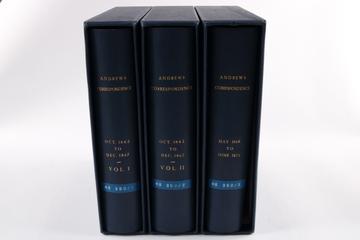
Andrews, Thomas 1813 - 1885
- Nationality:
- Irish; British
(1813-1885) Chemist, physicist
Thomas Andrews was born on the 19th december 1813 in Belfast and educated at the Belfast Academy and the Belfast Academical Institution, where he became proficient in French, and then spent a short time in his father's office, which he left in 1828 for the University of Glasgow, where he studied chemistry.
In 1830 Andrews travelled in France, reaching Paris in time for the winter lectures given by many of the leading French chemists. The following years were occupied in medical studies, where in 1835 he received the diploma of the Royal College of Surgeons of Edinburgh and graduated MD. He was appointed to teach chemistry in the Royal Belfast Academical Institution where for ten years he was occupied in this way, and gradually became known to the scientific world as the author of valuable papers on subjects connected with voltaic action and heat of combination.
In 1845 Andrews was appointed vice-president of the Northern College (later Queen's College, Belfast), and resigned both his teaching position and his private practice. In 1849 came the opening of the Queen's colleges, in the organization of which Andrews had been engaged since 1845, and he was then appointed to the professorship of chemistry in Queen's College, Belfast, a post which he held until 1879.
Andrews's most important researches were those dealing with heat of combination, ozone, and the continuity of the gaseous and liquid states of matter. The experiments on ozone, which were partly carried out in conjunction with P. G. Tait, finally established it as an allotropic form of oxygen, which can be prepared in a number of different ways. This work moreover laid the basis for future researches which clarified its relationship to oxygen.
By far the most brilliant and far-reaching of Andrews's discoveries, however, was that of the existence of a critical temperature above which a gas cannot be converted into a liquid by pressure, however great. His records of the behaviour of carbonic acid gas under varying temperatures and pressures served as the foundation of later work on the continuity of the gaseous and liquid states of matter. These researches, moreover, pointed out the fundamental condition for the liquefaction of all gases; they were the basis for later liquefaction of other known gases including air and refrigerants.
Andrews was elected a fellow of the Royal Society on 7 June 1849, and an honorary fellow of the Royal Society of Edinburgh in 1870. The degree of doctor of laws was conferred upon him by the University of Edinburgh in 1871, by Trinity College, Dublin, in 1873, and by the University of Glasgow in 1877, and that of DSc in 1879 by the Queen's University of Ireland. He was president of the chemistry section of the British Association at Belfast in 1852, and again at Edinburgh in 1871, and was president of the association at Glasgow in 1876. In 1880 he declined the offer of a knighthood. His connection with Queen's College was commemorated by the establishment after his death of an Andrews studentship.
After his resignation of the offices of vice-president and professor of chemistry in Queen's College, he retired to Fort William Park, Belfast, where he died on 26 November 1885.